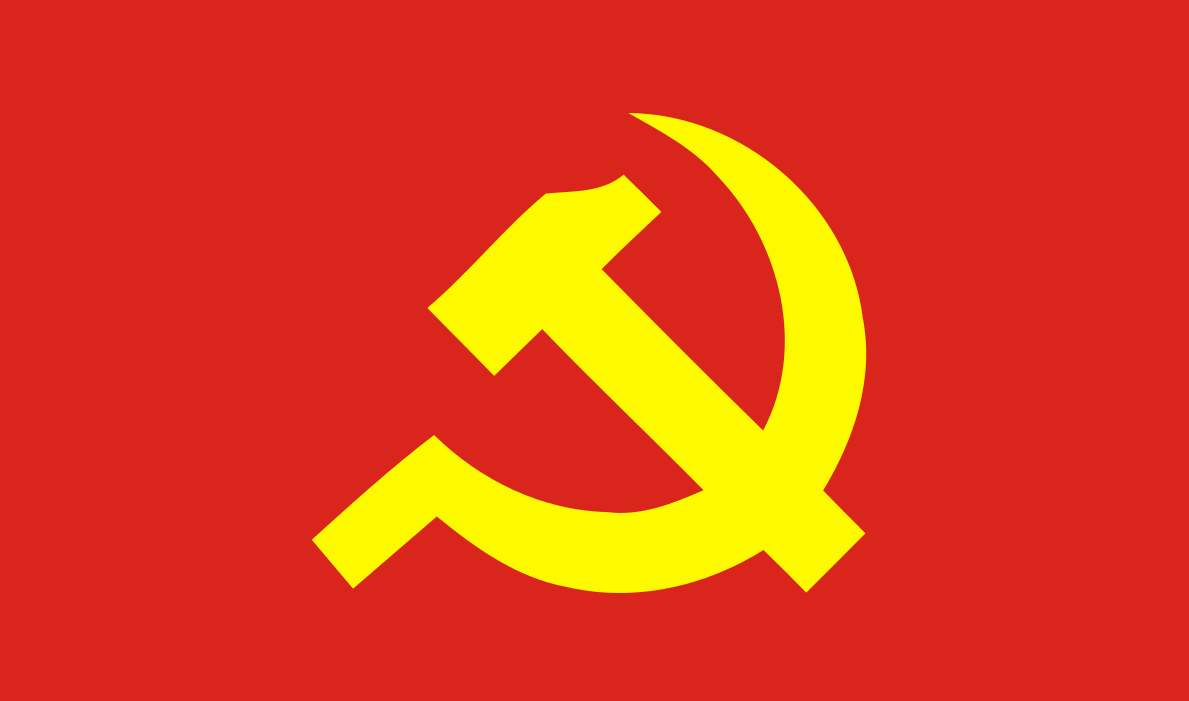
The conference was attended by comrade Dinh Van Huong - Standing member of the Party Committee, Head of the Propaganda Department of Vietnam National University, Hanoi and more than 80 party members of the Party Committee and branches in the Party Committee of the University of Social Sciences and Humanities. The conference was chaired by comrade Nguyen Van Kim - Standing member of the Party Committee of Vietnam National University, Hanoi, Secretary of the Party Committee of the University and comrade Pham Quang Minh - Deputy Secretary of the Party Committee of the University.
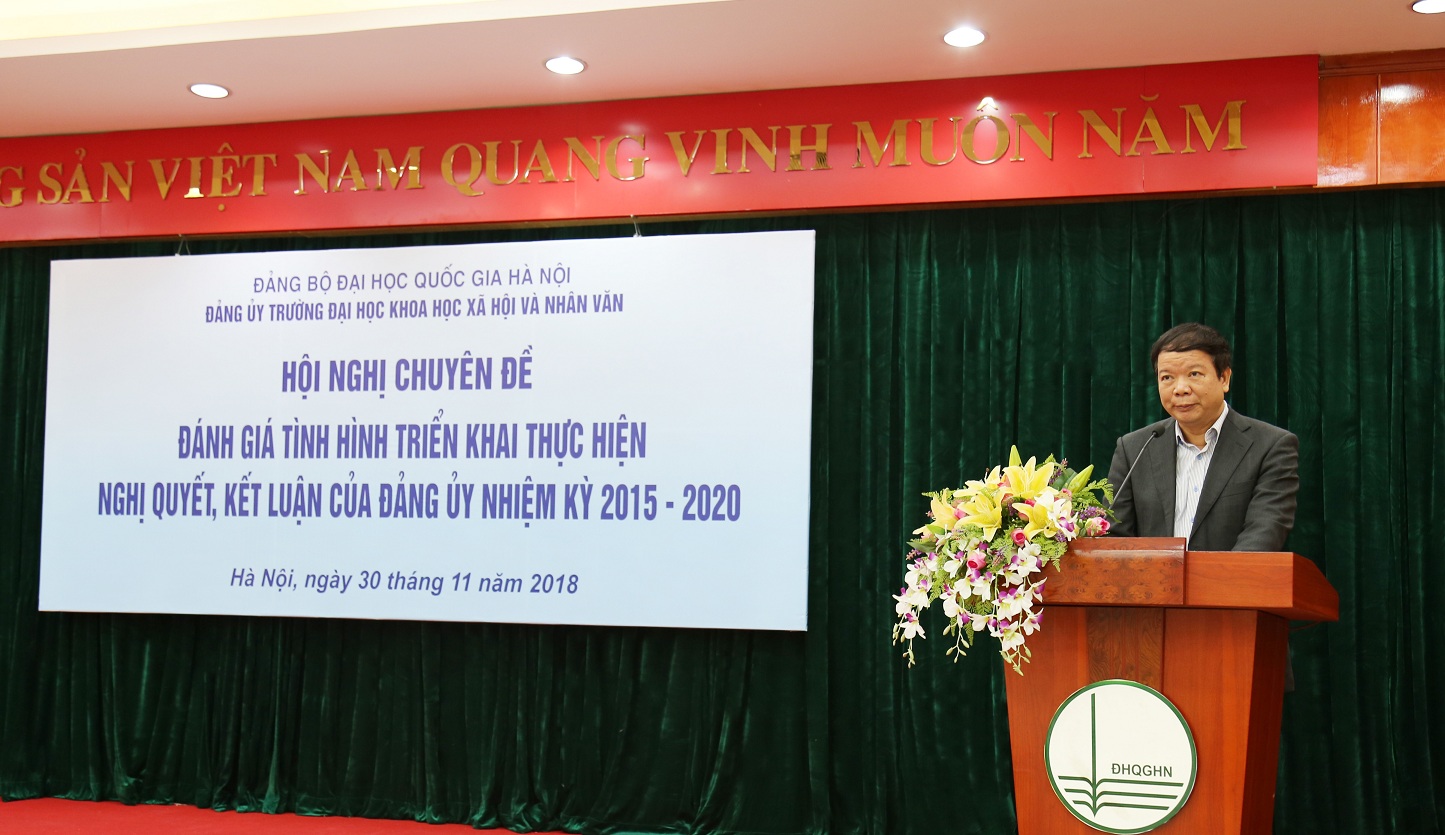
Comrade Nguyen Van Kim - Standing Member of the Party Committee of VNU, Secretary of the Party Committee of the University delivered the opening speech at the Conference
On April 27, 2016, the Party Committee of the University issued Resolution No. 114-NQ/DU on the orientation and solutions for building a research university, aiming to unify the awareness and determination of all Party members, civil servants, public employees and students of the University on the development strategy of the University of Social Sciences and Humanities according to the research university model. On that basis, the Party Committee has drawn conclusions on key solutions to carry out the above tasks.
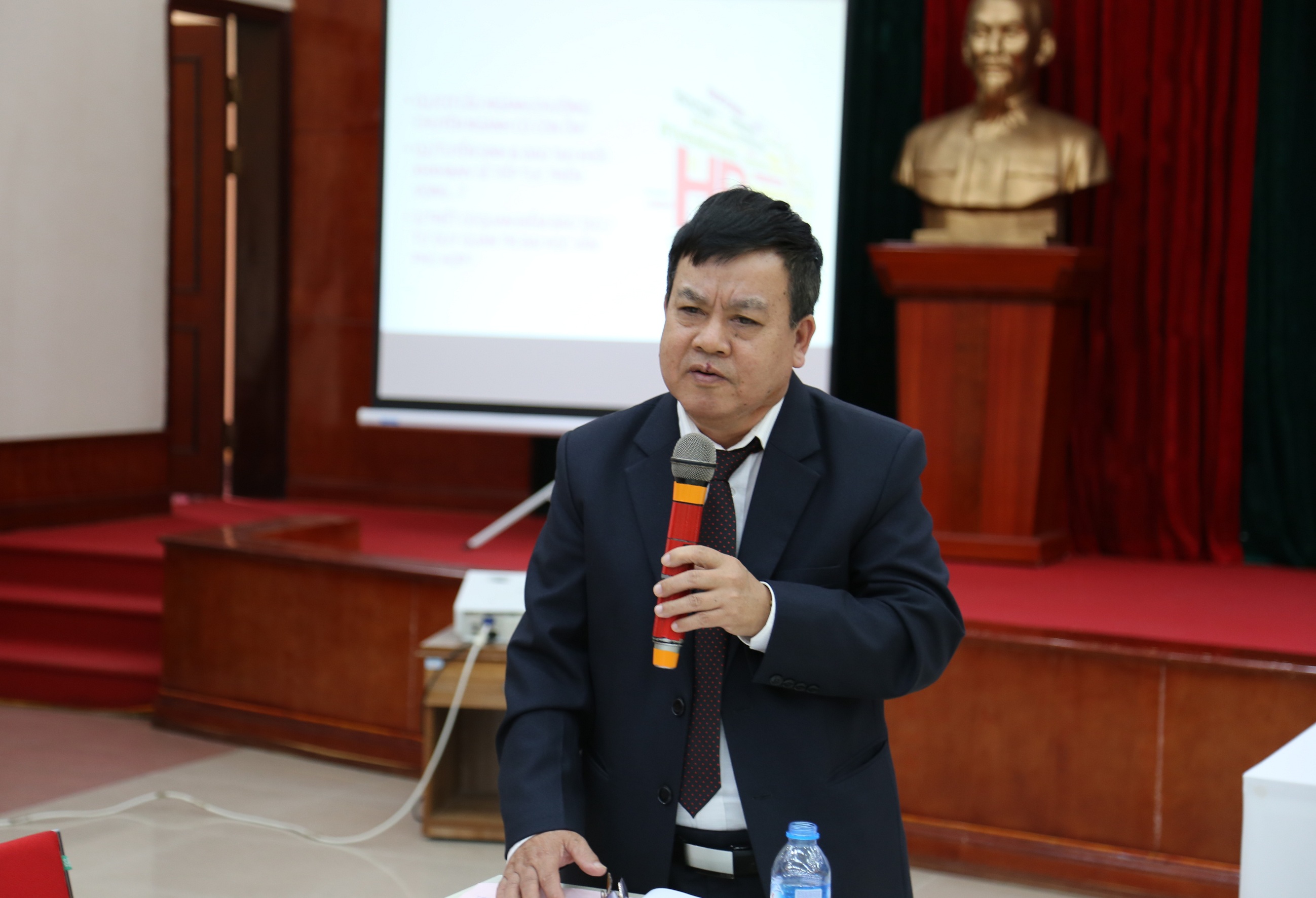
Comrade Dinh Van Huong - Standing Member of the Party Committee, Head of the Propaganda Department of Hanoi National University spoke at the Conference
Positive changes in awareness of building research universities
On behalf of the Professional Board, reporting on the implementation of the above Resolution, comrade Vu Van Quan emphasized: there has been a positive change in awareness of the need to build the University of Social Sciences and Humanities in the direction of a research university. This awareness has been strongly spread from the leadership level in the Party Committee, the University down to the units and to the staff. The awareness of building a research university is reflected in the following basic points: scientific research must be the focus, training towards high quality, and deep integration of all fields of activity with the international community.
In addition, the spirit of initiative, dynamism and creativity in performing tasks has appeared in many units, research groups and individuals. Along with that are timely mechanisms and policies for staff such as support for international publications, publishing works, attending scientific conferences abroad, etc.
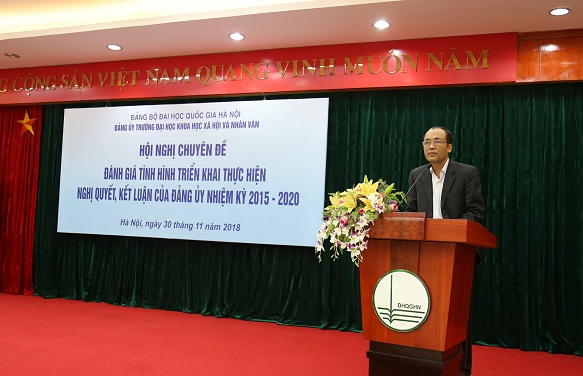
Comrade Vu Van Quan - Standing Member, Head of the Party Committee's Professional Department: There has been a positive change in awareness of the need to build a School in the direction of a research university.
The report also reviewed the outstanding results achieved by the School Party Committee: there were positive changes and transformations in the training model with the establishment of the model of research and training institutes; the model of one unit but with many training majors, helping to save resources, creating connectivity in research and training. The work of developing the team has had encouraging signs whenThe number of qualified staff in terms of academic titles and degrees is increasing, demonstrating good professional capacity in research and training, with the ability to succeed and continue the previous generation. The school has made remarkable progress and has gradually increased in the quantity and quality of programs, projects, topics, and scientific tasks in recent years. International publications have increased sharply, university training has had positive changes reflected in stable enrollment and growth each year; input quality has been improved; the school is a trusted address for learners with attractive majors... Facilities have clearly improved.
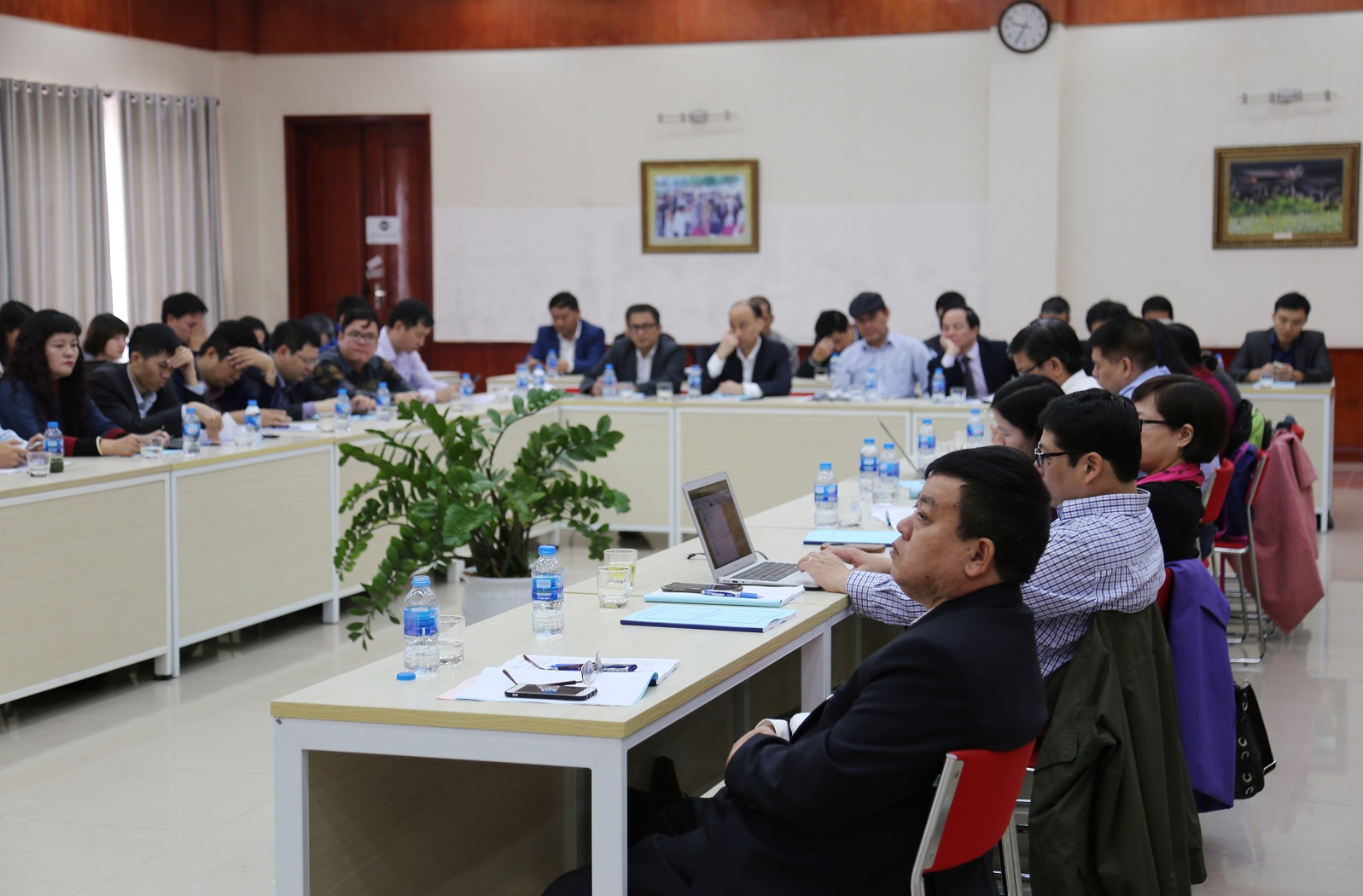
Promoting the core role of strong Research Groups
Report on assessment of the implementation of conclusion 188-KL/DƯ on“Promoting scientific research products in the context of building a modern research university”presented by Mr. Dao Thanh Truong (Head of the Faculty of Management Sciences) at the Conference. The report shared information on the highlights of the School's scientific research activities: the number of publications in the period 2015-2018 continuously increased over the years, of which domestic publications accounted for more than 80%; publications in ISI and Scopus journals also increased nearly 3 times. In 2017-2018, the School published 25 monographs, compiled 62 lectures and textbooks. The Journal of Social Sciences and Humanities and the Journal of Policy and Management were transferred to the School, helping to increase publication opportunities for research groups and researchers in the field of Social Sciences and Humanities.
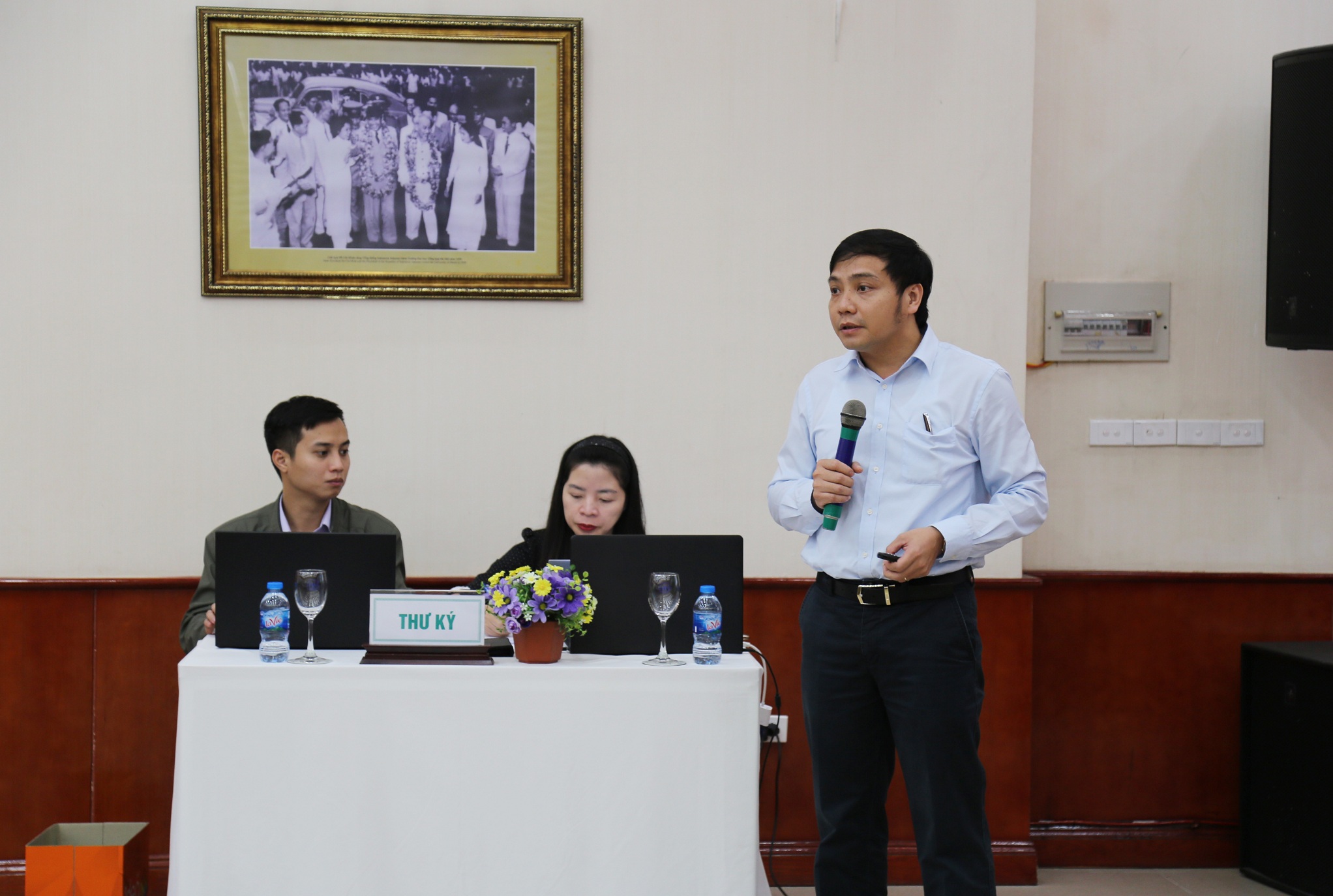
Comrade Dao Thanh Truong (Party Committee member, Deputy Secretary of the Faculty of Management Sciences Party Cell): It is necessary to further promote the role of the Policy Advisory Council, thereby promoting proposals, recommendations, and policy advice on issues at the national level.
Research results of topics at all levels increased: in 2015, the School had 02 more State topics, in 2016 it increased by 11 State topics, including 08 National History topics. In 2017, there were 02 more State topics and in 2018 there were 03 more State-level research tasks. In 2018-2019, the School's scientific staff will have 07 more component tasks belonging to national-level topics. The number of international seminars, conferences and strong research groups at the National University level has all increased.
To continue implementing conclusion 188-KL/DU more strongly and extensively in the coming time, the report proposes a number of solutions:
Firstly, further promote the role of the School's Policy Advisory Council, thereby promoting scientific proposals, recommendations and policy advice at the national level on social sciences and humanities issues to central agencies of the Party and State.
Second, it is necessary to put strong research groups in their rightful positions. These research groups will be assigned functions and tasks, and at the same time, there must be investment to build a development roadmap, research orientation and produce key scientific products.
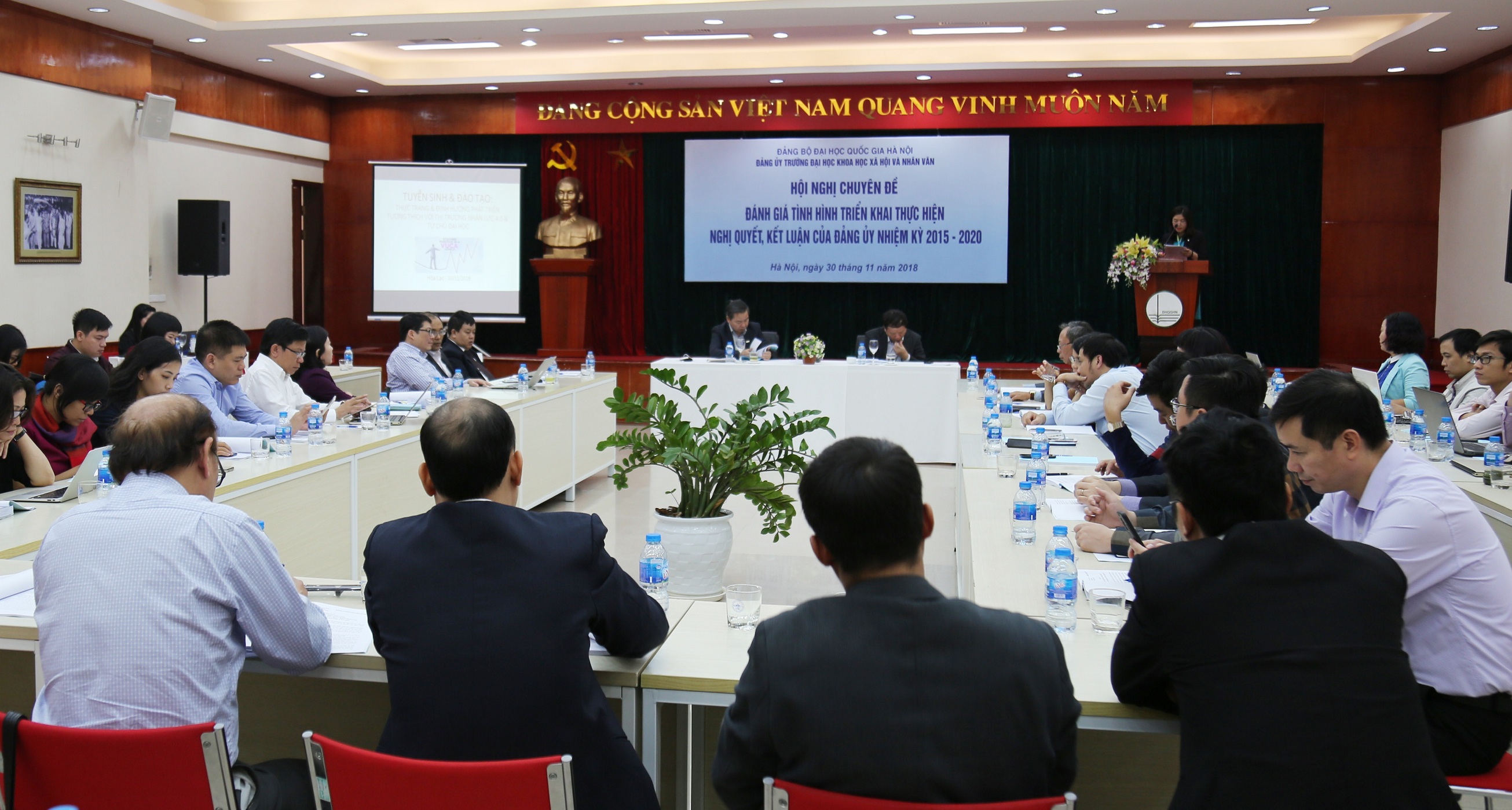
Third, it is time for the School to consider establishing interdisciplinary and transdisciplinary research groups to solve major interdisciplinary problems, creating products of high social significance, clearly demonstrating the School's social responsibility as a leading research center in the fields of social sciences and humanities in Vietnam.
Fourth, there is a plan to increase the number of specialized journals and scientific magazines managed by the School to meet regional and international standards; there is a policy to diversify financial resources, to be more closely linked with localities and businesses, to promote the transfer of research results, to form new research organizations, startup centers, start-ups, etc.
Building organizational structure and developing team: following the roadmap and achieving set targets
Next, the Conference listened to a report presented by comrade Ngo Thi Kieu Oanh (Standing Member of the Party Committee, Head of the Personnel Organization Department) on“Building organizational structure and developing staff in the direction of research university”According to Conclusion 169-KL/DƯ of the School Party Committee. The report mentions 3 groups of issues: organizational structure, personnel work and policy.
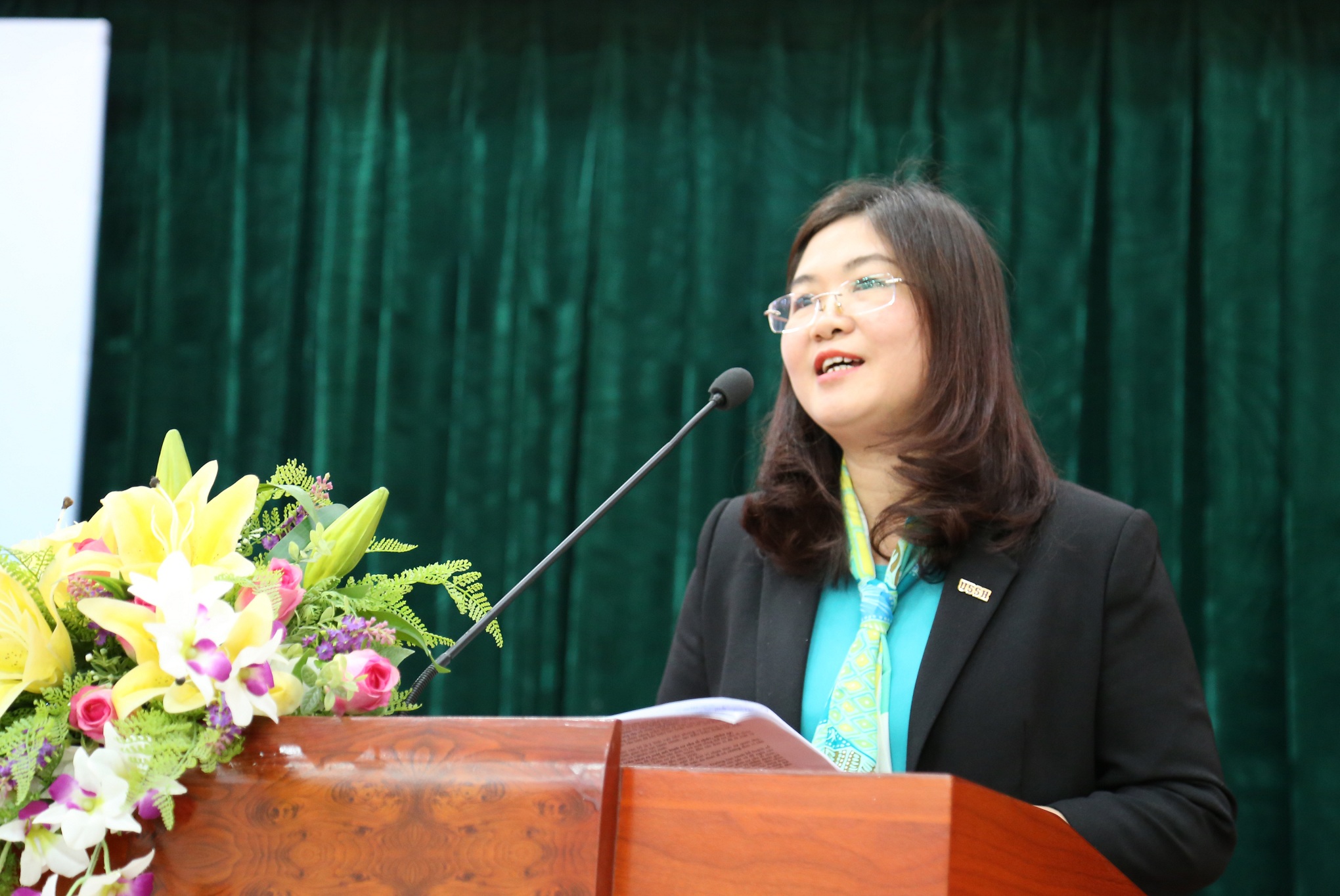
Comrade Ngo Thi Kieu Oanh (Member of the Party Committee Standing Committee, Head of the Party Committee Inspection Committee, Head of the Personnel Organization Department) assessed: the work of building the organizational structure and developing the team closely follows the roadmap and plan set out in the conclusions and resolutions of the Party Committee. Although many remarkable results have been achieved, this work still faces many challenges in the coming time.
About organizational structureThe School has made important adjustments to the model and organizational structure of training and scientific research; reviewed all units in the School and oriented to convert some units to the new model. Research centers are restructured in the direction of integrating interdisciplinary research centers, adjusting functions or dissolving ineffective centers that are not suitable for the development orientation of the School. In particular, departments continue to be consolidated in the direction of linking each training major with the development of the department and inter-department. The administrative apparatus is adjusted in the direction of streamlining, compactness, promoting the spirit of service, meeting the requirements of developing professional activities of the School in the direction of research.
On personnel workThe school has clearly identified recruitment needs for each department and the roadmap from 2016-2020 as a basis for personnel for units, while prioritizing concentrated investment in units and departments that are lacking staff. Each year, the school recruits 7-8 lecturers on special occasions, signs contracts with an average of 16-17 lecturers, researchers and other positions, but this number is still lower than the required rate. Recruiting highly qualified personnel still faces many difficulties. The school also has a policy of not increasing the number of administrative staff, while at the same time requiring increasingly high levels of specialization and professionalism in the work of specialists.
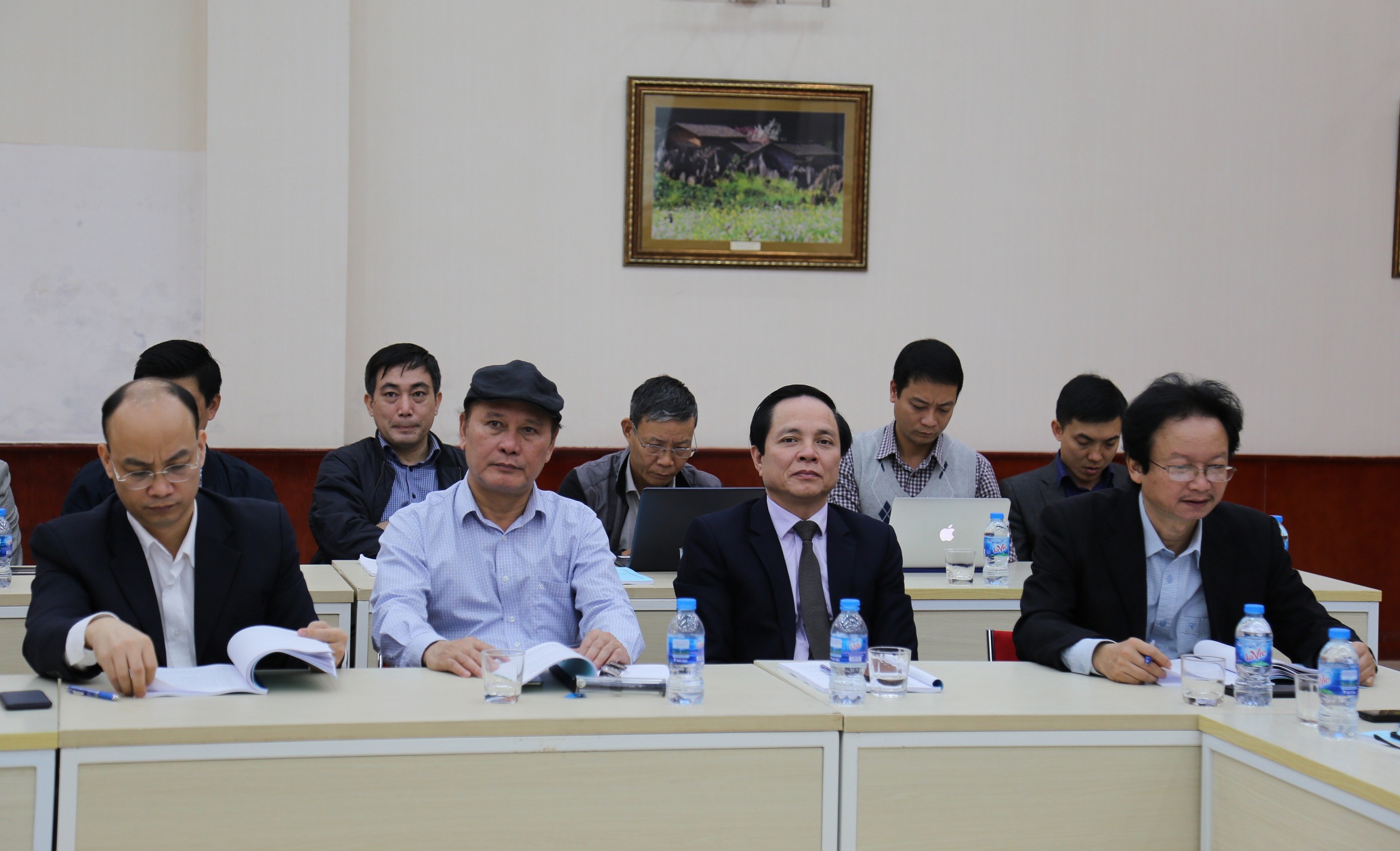
The work of training and fostering staff has many remarkable achievements with the rapid increase in the number and quality of the team: the number of PhD students defending their theses has increased dramatically in recent years, with an average of 22 staff defending their theses each year. The rate of lecturers meeting PhD standards in 2015 was 53.8%, in 2017 it was 60.3% and by October 2018, this rate was 62.4%, closely following the set target. For lecturers meeting the standards of Professor and Associate Professor, the School's rates were 26.9% (2015), 26.5% (2016), 26.9% (2017), 29.1% (2018) respectively, compared to the set target of 27.4%.
On policy issuesAlthough the school's financial situation is difficult, investment in the school's staff is a priority. Policies for staff are always maintained and stable.
Proposing solutions for building organizational structure and developing staff, the Report mentions the upcoming key tasks: closely following the plan for developing the organizational structure of units until 2020 as a basis for effectively using resources at units; seriously implementing the policy of streamlining the organizational structure of departments; completing the review and restructuring of centers; reviewing and evaluating the annual staff planning and closely following the quantity and quality of staff to have appropriate solutions; having a roadmap and plan to develop a group of leading experts and building a research culture; promoting priority training and fostering of the team of leaders and managers in the planning area; promoting the dissemination of documents, policies of the School and legal documents to staff...
Towards university autonomy: the focus is on human issues
Presenting solutions to promote training activities towards university autonomy in 2020, comrade Hoang Anh Tuan (Vice Principal of the School) said: the center of all activities and all solutions and development policies is still the human issue. To promote the staff of more than 500 people, there must be drastic policies and appropriate mechanisms to liberate professional capacity, stimulate creativity, create motivation for staff to contribute and stick with the School, thereby avoiding the brain drain - a problem that public universities in Vietnam are facing today.
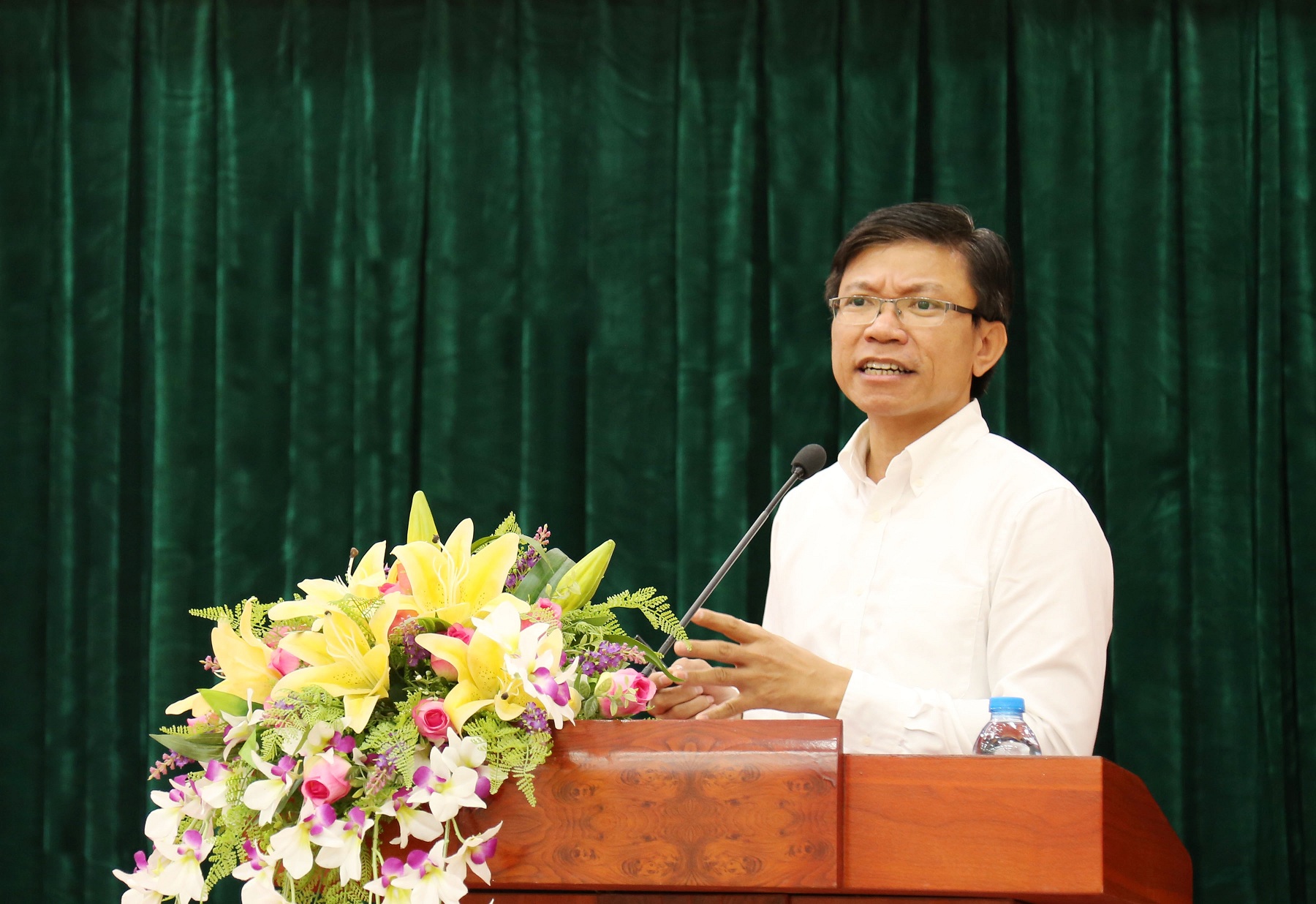
Comrade Hoang Anh Tuan - Party Committee member, Vice Principal of the School
Regarding the structure of training sectors and occupations, in the face of the fact that the connection between sectors and occupations has now "faded" a lot, comrade Hoang Anh Tuan said that, in addition to investing to maintain and develop basic training sectors, the School should carefully study interdisciplinary and cross-disciplinary trends to form new training sectors, meeting the human resource needs of the fourth industrial revolution that is taking place strongly.
Discussing the University's university management thinking to be compatible with changes in future human resource needs as well as innovation trends of the world university ecosystem, the Vice President affirmed: today, research-oriented university has basically become a common spirit, a common development platform, a "natural" recognition of world universities; instead, they are moving towards a university model associated with social development practices (entrepreneurship-driven university). So, are we ready to think about new trends that can go beyond the research university model that many universities in the world are aiming for? For example: training orientation associated with the digital human resource market, regional and global integration; scientific research in the context of the 4.0 industrial revolution... Affirming appropriate university management thinking is very important, because on that basis, appropriate mechanisms and solutions will be proposed for implementation: from building new or adjusting training majors, organizing teaching, managing students, connecting with businesses and markets...
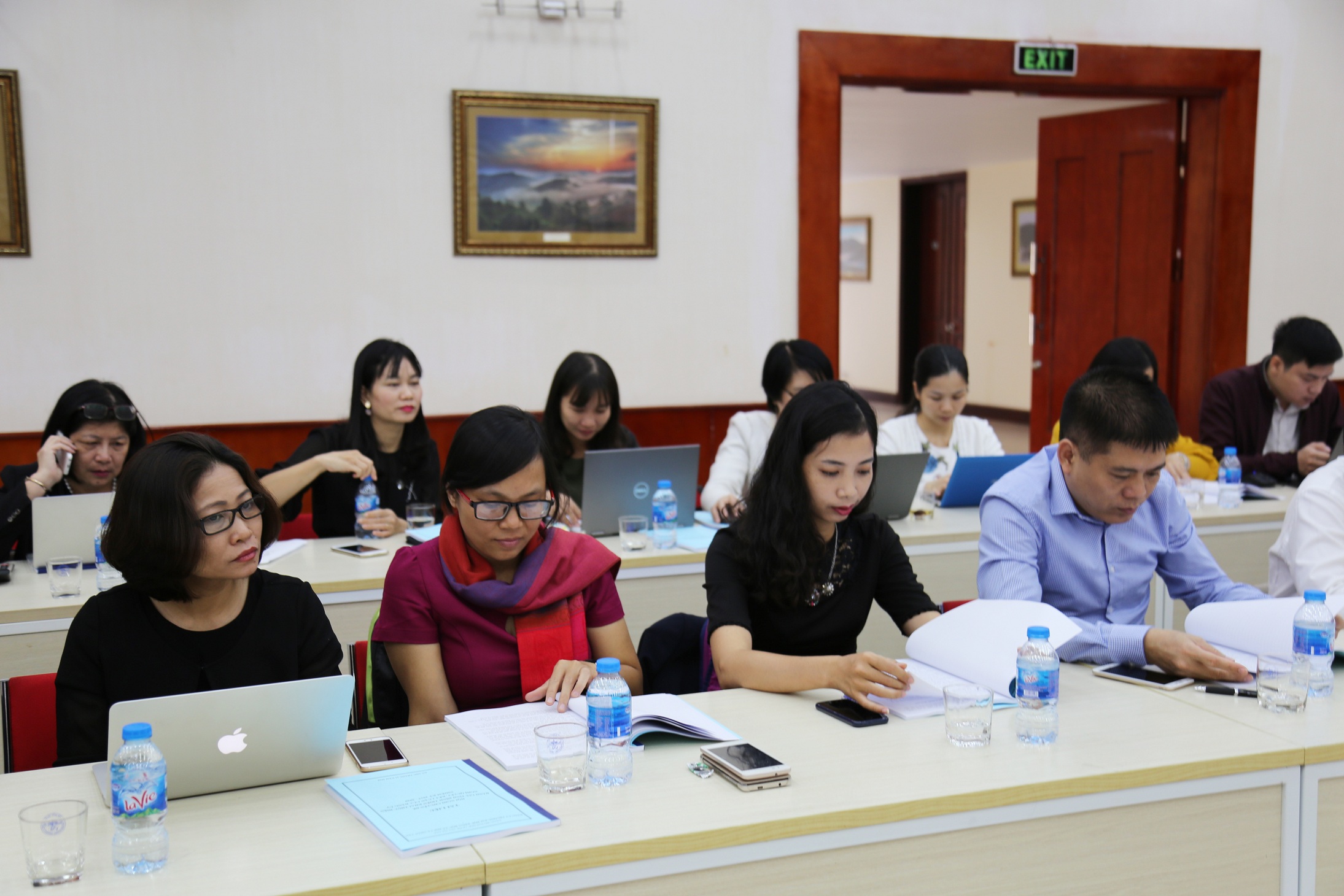
International integration in research and training: still a big gap
“There is still a big gap between Vietnam's education and training and universities in the region and internationally” - that was the statement of comrade Pham Quang Minh (Permanent Deputy Secretary, Principal of the University) when presenting the report on “Promoting integration in education and training in the context of globalization” (Conclusion No. 300 of the Party Committee dated September 18, 2017).
The report points out the shortcomings and differences in university training in Vietnam compared to the world, from training programs, course content, training methods... to issues of facilities and staff standards.
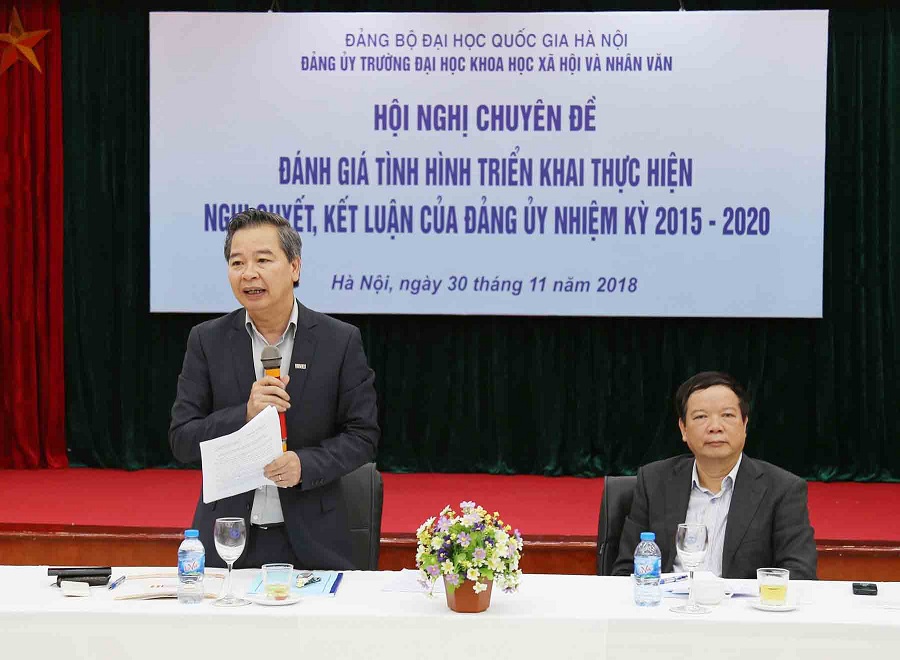
Comrade Pham Quang Minh (Permanent Deputy Secretary, Principal of the School): There is still a big gap between Vietnamese and international universities on the path of integration.
"In the world today there is a term calledmobility- the transformation - promoting dynamism in human thinking, in training programs, in research and teaching methods. However, it seems that the above issues in Vietnamese universities are still very "static", with little change.
Evaluating the results of the implementation of conclusion No. 300-KL/DƯ, comrade Pham Quang Minh said that the awareness of the importance of promoting international integration has been greatly raised among the staff. Now at the University of Social Sciences and Humanities, everywhere you can hear discussions about how to publish internationally, how to teach in English?
Regarding the Party Committee's goal of internationalizing 1-2 outstanding training programs, the School has been building a Vietnamese Studies training program in English according to international standards, and plans to enroll students next year. The School is building a university-level training program on Southeast Asian Studies, and establishing a specialized department of International Development Studies (Faculty of International Studies) with the first batch of students in 2018.
On the campus of the School, we can see more and more foreign experts, students and volunteers coming to study and research here. Foreign projects that the School is a member of such as ENHANCE… have helped to improve the capacity of the team.
Regarding solutions to promote international integration in education and training, the report gives us some suggestions: innovating training programs in the direction of updating with the world; reviewing subjects, reducing subjects that are far from the major and allowing students to choose to study credits in other majors, avoiding the situation of single majors and closed training; increasing internship and practical activities for students, especially internships abroad...
Party Committee of University of Social Sciences and Humanities: 9 consecutive years of being a clean, strong, and exemplary Party Committee of VNU
After listening to the reports and discussions at the Party work conference, on behalf of the Party Committee and the Standing Committee of VNU, comrade Dinh Van Huong acknowledged and highly appreciated the Party work of the Party Committee of the University of Social Sciences and Humanities: "This is one of the Party Committees that works in a disciplined, methodical and serious manner, fully implementing the regulations of the Party Committees at all levels".
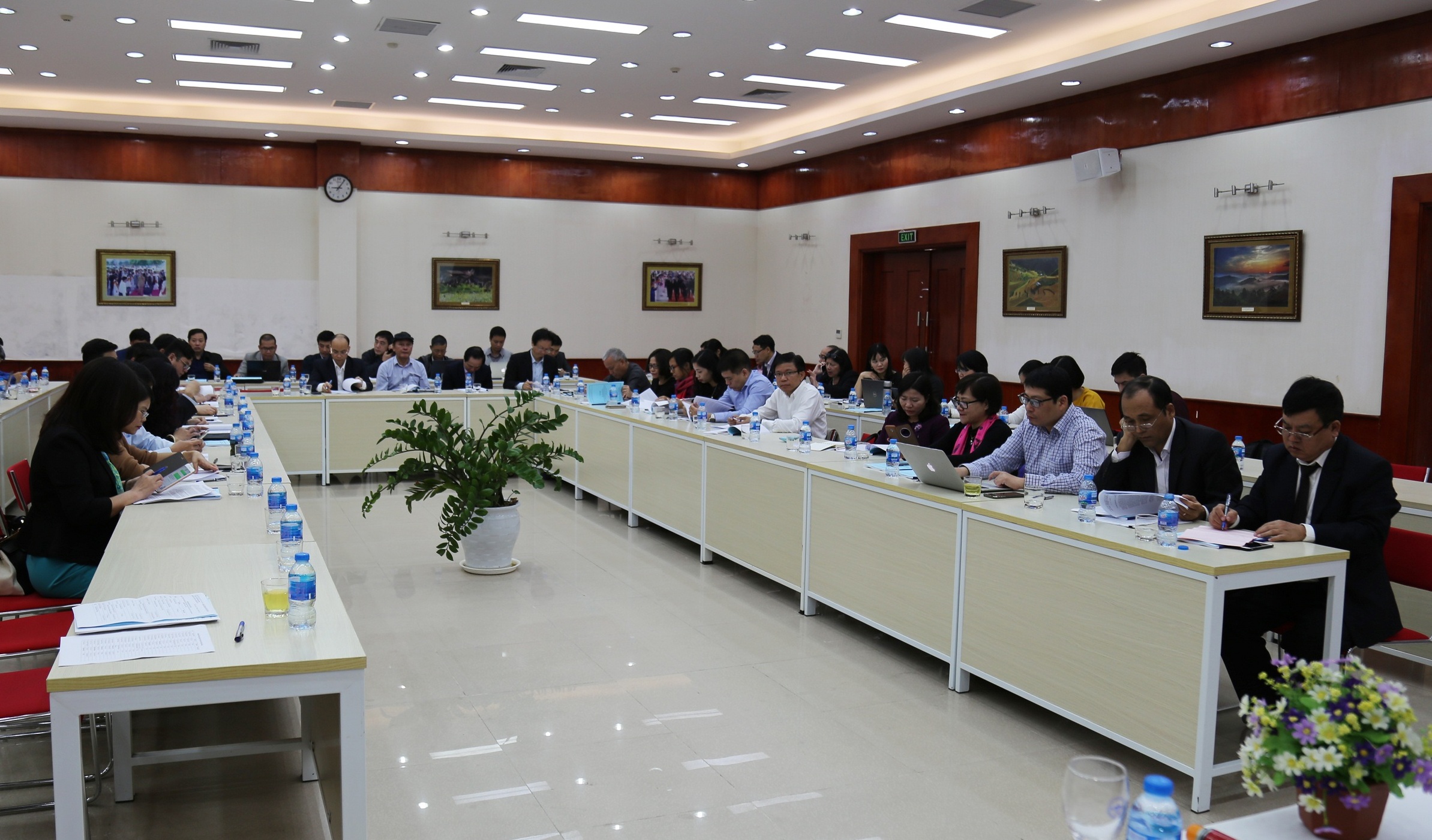
Comrade Dinh Van Huong also shared his joy with the outstanding achievements of the School Party Committee, demonstrated through the team of Professors and Associate Professors with the best quality in the country, through the noble medals of the Party and State, the certificates of merit of the Prime Minister, and other noble titles for units and individuals in 2018: "This is a typical product demonstrating the effective leadership of the School Party Committee and the efforts of the staff. That is a great achievement of the School that needs to be recognized and appreciated."
For 9 consecutive years, the Party Committee of the University of Social Sciences and Humanities has been a clean, strong and exemplary Party Committee of the Vietnam National University. With that in mind, Comrade Nguyen Van Kim - Secretary of the Party Committee of the University has requested the Party Committee and the Board of Directors of the Vietnam National University to pay more attention to investing resources for the development of the University at the new campus in Hoa Lac; creating conditions for the University's scientific staff to promote their capacity through being assigned to carry out major scientific tasks of the University and the country. In addition, in the strategy of planning and developing the leadership staff of the University, the strong human resources in both quantity and quality of the University will be a supplementary source, contributing effectively to the overall development of the University.
Author:Thanh Ha
Newer news
Older news